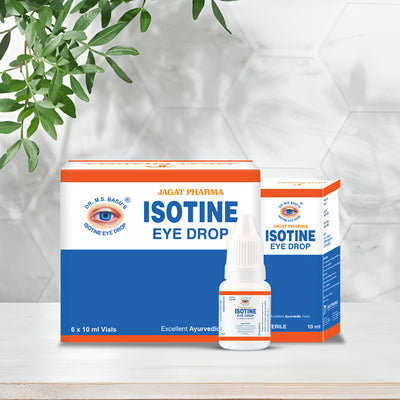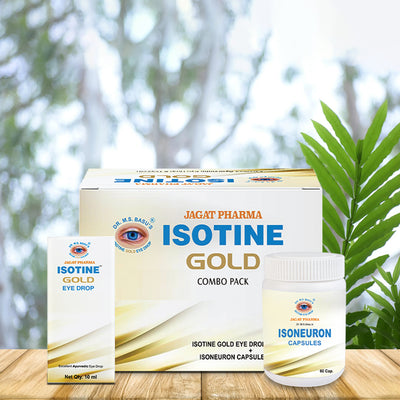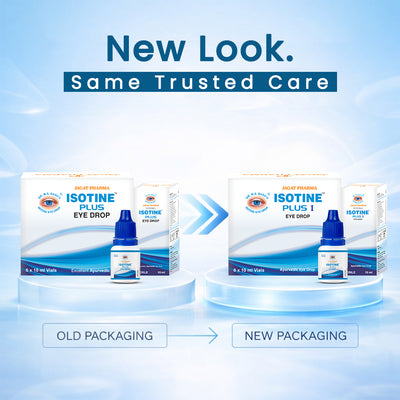
Eye Care Tips for a Monsoon Season
During the monsoon season, conjunctivitis, commonly known as pink eye, becomes a concern due to increased humidity and potential exposure to bacteria or viruses. To prevent conjunctivitis, it's essential to maintain good hygiene practices as well as the necessity of conjunctivitis eye drops increases. Early diagnosis and treatment can stop the spread of conjunctivitis and ensure your eyes stay healthy throughout the monsoon season. Let's delve into eye care tips.
Monsoon Eye Care Tips
1. Avoid Touching Your Eyes:
Reason: The hands are frequent carriers of bacteria and viruses from surfaces, especially during the monsoon when moisture and humidity create favorable conditions for microbial growth. Touching your eyes with unwashed hands introduces harmful germs, which potentially leads to infections such as conjunctivitis.
Tip: Wash your hands thoroughly with soap & water for at least 20 seconds before touching your eyes, inserting contact lenses, or applying eye drops. Do not rub your eyes, as this can irritate them and potentially spread infections.
2. Use Protective Eyewear:
Reason: Sunglasses with UV protection are essential even on cloudy days during the monsoon. UV rays can pass through clouds & cause harm to the eyes, leading to conditions like macular degeneration, cataracts, and photokeratitis (sunburn of the cornea). Additionally, sunglasses provide a barrier against dust, pollen, and other airborne particles that are prevalent during windy monsoon weather.
Tip: Choose sunglasses that block 100% of UVA and UVB rays. Choose labels that suggest UV 400 protection. Wrap-around styles or those with large lenses offer better coverage and protection from side glare and wind-blown debris.
3. Maintain Hygiene:
Reason: Good hygiene practices are crucial for preventing eye infections, which can spread easily in humid and rainy conditions. Conjunctivitis (pink eye) and other infections can be transmitted through direct contact with contaminated hands or surfaces.
Tip: Wash your hands frequently with soap and water, especially after touching public surfaces or before handling contact lenses. Avoid sharing towels, pillows, or eye makeup to decrease the risk of spreading bacteria or viruses.
4. Stay Hydrated:
Reason: Proper hydration is essential for maintaining optimal tear production and preventing dry eyes, which can be exacerbated by humidity changes during the monsoon season. Dry eyes can cause discomfort, irritation, and an increased risk of eye infections.
Tip: Keep yourself hydrated by drinking lots of water throughout the day. Drink at least 8 glasses (64 ounces) everyday, adjusting based on your activity level & the climate. Limit drinking caffeinated and alcoholic beverages, as they can dehydrate you.
5. Use Lubricating Eye Drops:
Reason: Humidity fluctuations during the monsoon can lead to dry eyes, causing symptoms such as itching, burning, and redness. Lubricating eye drops help replenish moisture in the eyes and provide relief from dryness and discomfort.
Tip: Choose preservative-free lubricating eye drops recommended by your eye doctor. Use them as needed throughout the day, especially if you spend prolonged periods in air-conditioned environments, which can further dry out the eyes.
6. Cleanse Your Eyes Properly:
Reason: Rainwater can carry pollutants, dust, and allergens that may irritate the eyes and increase the risk of infections. Proper cleansing helps remove these particles and reduces the likelihood of eye discomfort or infections.
Tip: If your eyes come in contact with rainwater or dust, avoid rubbing them, as this can exacerbate irritation. Rinse your eyes gently with clean, lukewarm water to flush out contaminants. After washing your face, use a clean towel to gently pat it dry & avoid touching it.
7. Avoid Sharing Personal Items:
Reason: Sharing towels, handkerchiefs, or eye makeup can transfer bacteria and viruses that cause eye infections like conjunctivitis. Additionally, sharing contact lenses or their cases without proper hygiene practices can be responsible for serious eye complications.
Tip: Use separate towels and avoid sharing personal items that come into contact with your eyes. If you wear contact lenses, adhere to rigorous hygiene practices like washing your hands before handling lenses and regularly disinfecting both lenses and storage cases.
8. Eat a Nutritious Diet:
Reason: A healthy diet rich in vitamins and antioxidants supports overall eye health and helps reduce the risk of eye diseases. Essential nutrients like vitamin A, C, E, omega-3 fatty acids, and antioxidants are crucial to maintaining clear vision and protecting against age-related eye conditions.
Tip: Include a variety of colorful fruits and vegetables in your diet, such as carrots, spinach, kale, oranges, berries, nuts, and fatty fish like salmon or tuna. These foods provide essential nutrients that promote eye health and support immune function.
8. Regular Eye Check-ups:
Reason: Regular eye exams are vital for detecting and managing eye conditions early, even if you do not have vision problems. Comprehensive eye exams can identify changes in vision, eye diseases, or underlying health issues that may require treatment.
Tip: Schedule routine eye exams with an eye care professional, at least once a year or as recommended. Early detection & treatment of eye conditions can help save vision and maintain optimal eye health.
ISOTINE Eye Drop for Eye Irritation, Allergies & Infections
Isotine Eye Drops blend potent botanical herbs such as Palash, Apamarg, Punarnava, and Tuth Bhasma in an Ayurvedic formulation to effectively enhance vision and alleviate conditions like conjunctivitis, redness, night blindness, eye fatigue, and weak eyesight. Endorsed by Dr. Basu, these drops promote regular use to improve blood circulation, reduce oxidative stress, and nourish eye tissues naturally. They offer a safe alternative for managing eye irritation, allergies, and infections, suitable for all ages, as they are Ayurvedic and free from side effects.
Conclusion
Maintaining good eye care practices during the monsoon season is essential for preventing eye infections and maintaining overall eye health. By following these tips, such as avoiding touching your eyes with unwashed hands, using protective eyewear, staying hydrated, maintaining proper hygiene and eating a nutritious diet rich in eye-boosting nutrients, you can significantly reduce the risk of eye ailments like conjunctivitis and dry eyes. Additionally, incorporating Ayurvedic solutions like Isotine Eye Drops, formulated with natural herbs to enhance vision and treat various eye conditions, offers a safe and effective alternative for managing eye irritations and allergies. Remember, regular eye check-ups are crucial for early detection and treatment of any eye issues, ensuring your eyes stay healthy and clear throughout the monsoon and beyond.


